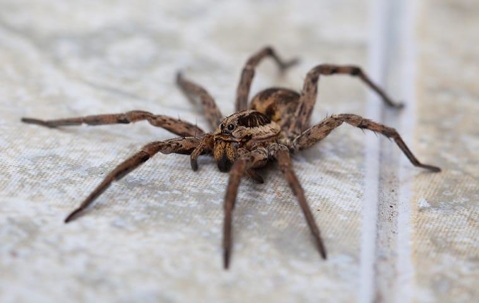Are all pests dangerous? No, and not every spider is a threat to your health. However, this is the 21st century: is it too much to ask for a spider-free home? At White Knight Pest Control, we don’t think so. No one likes the feeling of walking into the bathroom and seeing a spider in the sink, especially when that discomfort could easily be avoided. The wolf spider might be a gentle giant, a harmless home-invader. However, that doesn’t mean you want them hanging around your house.
Webless Wolf Spiders
Wolf spiders are common household invaders across Colorado. These large, brown spiders are unique in that they don’t use webs to catch their prey. Instead, they use their speed to hunt down other insects around your home and property, which many people would say is a favor to you.
However, while they serve a helpful role as a natural form of pest control, watching these intimidating spiders scurry into the corner when you enter a room can be very frightening, especially since they like to frequent bathrooms, kitchens, and basements, using their natural camouflage to surprise other pests (and you).
As talented hunters, wolf spiders are akin to their namesake in that way, but it’s actually their appearance that led to the name. Wolf spiders have lots of short, brown/gray hairs stemming from their legs, giving them a wolf-like appearance.
These hairs are one way you can distinguish the wolf spider from other brown spiders, which is important since you don’t want to confuse a wolf spider with the dangerous brown recluse spider. While they bear a resemblance to the brown recluse, wolf spiders are often much larger. (Brown recluse spiders usually only grow to the size of a quarter, including the legs, while wolf spiders can grow up to six inches in circumference).
Wolf Spider Prevention Strategies
If you’re tired of being scared of wolf spiders in your house, there are a few things you can do to prevent a recurring infestation. Spider-specific prevention techniques include:
- Clearing up the clutter: Wolf spiders are attracted to sheltered areas with plenty of clutter for hiding spots. This creates an ideal hunting environment.
- Sealing potential entry points: Applying more caulking to the cracks and crevices around your home’s foundation, along with the windowsills, can deter an easy entry for wolf spiders. You’ll also want to apply fresh weather-stripping to exterior doors.
- Utilizing effective general pest control practices.
That last one seems to be a little bit of a catch-all. However, while wolf spiders are not dangerous and cannot transfer their venom to humans, their presence in your home suggests that they think it is a good hunting ground. Basically, wolf spiders are telling you that you have a pest problem.
Since spiders are very hard to keep out of your house, they will almost always be a problem if you have pests living within your walls. The best way to keep them out, therefore, is to limit their food source. In order to create a more pest-free environment within your walls, we suggest the following strategies:
- Regular cleaning habits like vacuuming and mopping to limit crumbs
- Proper food and trash storage to take away easy access to food sources
- Addressing moisture issues like leaking pipes and humidity that attract a variety of pests
- Monitor your screens for tears or separations from the frame
- Proper lawn maintenance to limit moisture buildup and clutter in the yard
- Trimming back tree branches to limit easy roof access for invasive pests
Call White Knight Pest Control For Wolf Spider Solutions
While all of these strategies can be effective, there is no such thing as guaranteed pest prevention when you’re doing it yourself. Chances are infestations will continue to pop up, attracting wolf spiders or worse. To get guaranteed home pest control services you can count on, contact White Knight Pest Control for more advice or assistance.

